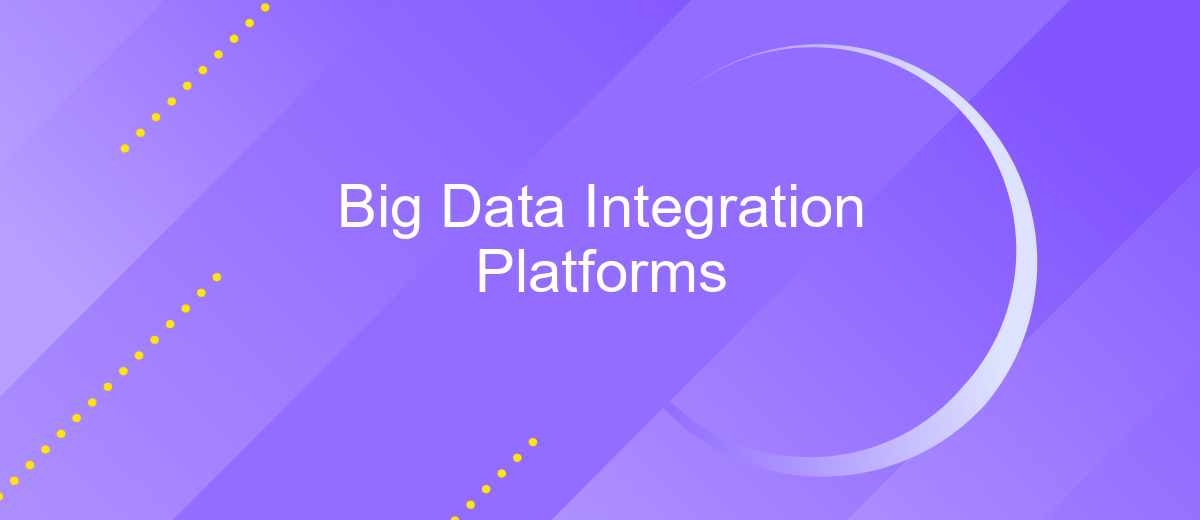Big Data Integration Platforms
Big Data Integration Platforms are essential tools for modern enterprises, enabling the seamless merging of vast and varied data sources. These platforms facilitate the extraction, transformation, and loading (ETL) processes, ensuring data consistency and accessibility. By leveraging advanced analytics and machine learning, they empower organizations to derive actionable insights, drive innovation, and maintain a competitive edge in today's data-driven landscape.
Introduction
Big Data Integration Platforms are essential tools for modern businesses, enabling them to seamlessly consolidate and analyze vast amounts of data from various sources. These platforms play a crucial role in helping organizations make data-driven decisions and maintain a competitive edge in today's fast-paced digital landscape.
- Streamlined data integration from multiple sources
- Real-time data processing and analytics
- Enhanced data quality and consistency
- Scalability to handle growing data volumes
- Support for various data formats and protocols
One such platform that excels in simplifying data integration is ApiX-Drive. It offers a user-friendly interface for setting up integrations without the need for extensive technical expertise. ApiX-Drive supports a wide range of applications and services, making it easier for businesses to automate workflows and ensure data consistency across their systems. By leveraging platforms like ApiX-Drive, organizations can efficiently manage their data ecosystems and focus on deriving actionable insights.
Market Overview

The Big Data Integration Platforms market is experiencing rapid growth, driven by the increasing need for businesses to manage and analyze vast amounts of data from diverse sources. These platforms enable organizations to seamlessly integrate, process, and analyze data in real-time, thereby enhancing decision-making and operational efficiency. The market is characterized by a wide range of solutions that cater to various industry needs, from healthcare and finance to retail and manufacturing.
One notable player in this space is ApiX-Drive, which offers a comprehensive suite of tools for automating and streamlining data integration processes. ApiX-Drive's platform allows users to connect multiple data sources with ease, facilitating the flow of information across different systems and applications. This not only reduces the complexity of data management but also ensures that businesses can leverage their data more effectively. As companies continue to prioritize data-driven strategies, the demand for robust Big Data Integration Platforms is expected to grow, making it a key area of focus for technology providers and enterprises alike.
Technical Architecture

The technical architecture of Big Data Integration Platforms is designed to efficiently handle vast amounts of data from various sources, ensuring seamless data flow and integration. These platforms typically consist of several key components that work together to collect, process, and store data.
- Data Ingestion Layer: This layer is responsible for collecting data from multiple sources, such as databases, APIs, and IoT devices. It ensures that data is ingested in real-time or in batches.
- Data Processing Layer: In this layer, the ingested data is processed and transformed using various techniques like ETL (Extract, Transform, Load) or ELT (Extract, Load, Transform). This is where data cleaning, normalization, and enrichment occur.
- Data Storage Layer: After processing, the data is stored in high-performance storage systems, such as data lakes or data warehouses, optimized for quick retrieval and analysis.
Integration platforms like ApiX-Drive play a crucial role in this architecture by offering automated data integration services. They enable seamless connectivity between different applications and data sources, simplifying the data ingestion process and ensuring that data is always up-to-date and readily available for analysis.
Benefits and Challenges

Big Data Integration Platforms offer numerous benefits, including the ability to consolidate diverse data sources into a single, unified view. This integration facilitates better decision-making and enhances data quality, enabling organizations to gain more accurate insights and drive strategic initiatives. Additionally, these platforms can automate data workflows, reducing manual effort and minimizing errors.
However, implementing Big Data Integration Platforms comes with its own set of challenges. The complexity of integrating various data sources, ensuring data security, and maintaining data integrity are significant hurdles. Organizations must also address issues related to scalability and performance to handle the growing volume of data efficiently.
- Improved data quality and accuracy
- Enhanced decision-making capabilities
- Automated data workflows
- Reduced manual effort and errors
For instance, services like ApiX-Drive can simplify the integration process by offering pre-built connectors and automated workflows. This can significantly reduce the time and effort required to set up and maintain data integrations, allowing organizations to focus on leveraging their data for strategic purposes.
Case Studies
One notable case study involves a leading e-commerce company that integrated its various data sources using a Big Data integration platform. The company faced challenges in consolidating data from multiple systems, including sales, inventory, and customer service databases. By leveraging the capabilities of a robust integration platform, they were able to streamline their data processes, resulting in improved decision-making and operational efficiency. This integration allowed the company to gain real-time insights into customer behavior, optimize inventory levels, and enhance overall customer satisfaction.
Another example is a healthcare provider that utilized the ApiX-Drive service to integrate patient records from different medical systems. Prior to this integration, patient data was scattered across various platforms, making it difficult for healthcare professionals to access comprehensive patient histories. With ApiX-Drive, they seamlessly connected these disparate systems, ensuring that all patient information was consolidated and easily accessible. This not only improved the quality of patient care but also reduced administrative overhead and minimized the risk of errors in patient records.
FAQ
What is a Big Data Integration Platform?
Why is Big Data Integration important for businesses?
How do Big Data Integration Platforms handle data security?
Can Big Data Integration Platforms be automated?
What are the key features to look for in a Big Data Integration Platform?
Do you want to achieve your goals in business, career and life faster and better? Do it with ApiX-Drive – a tool that will remove a significant part of the routine from workflows and free up additional time to achieve your goals. Test the capabilities of Apix-Drive for free – see for yourself the effectiveness of the tool.

